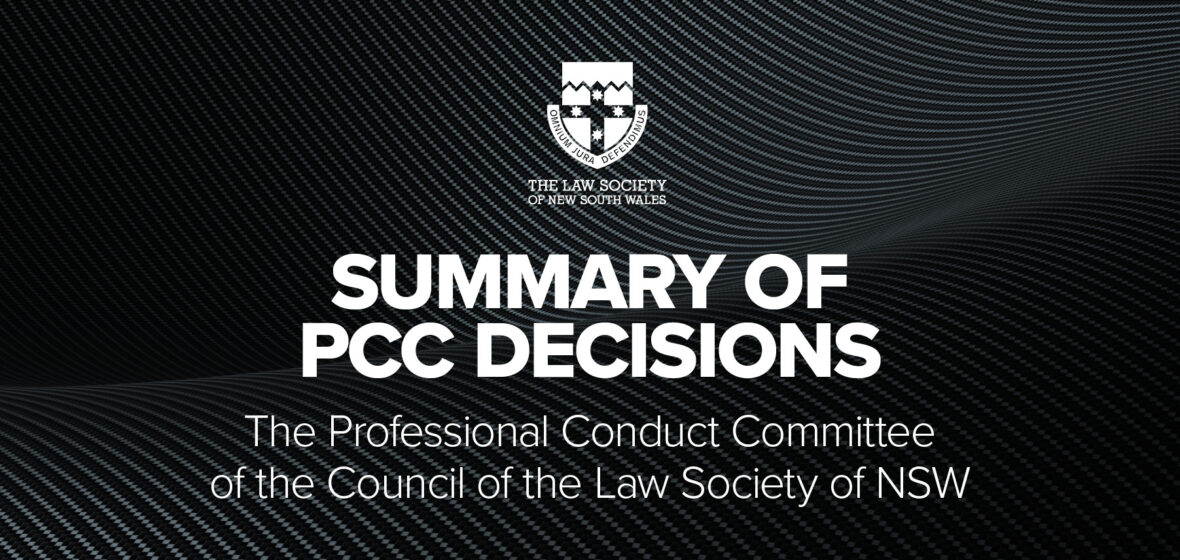The Professional Conduct Committee (PCC) of the Council of the Law Society of NSW (Council), under delegation from the NSW Legal Services Commissioner and the Council, deals with complaints referred to the Council by the NSW Legal Services Commissioner. A total of 193 matters were finalised during the October – December 2022 Quarter.
In relation to five complaints, relating to three solicitors, the Committee decided to refer the complaints to the NSW Civil and Administrative Tribunal (NCAT) because they may involve professional misconduct, or unsatisfactory professional conduct more appropriately determined by the NCAT. Those proceedings must be commenced in the next six months.
The PCC also determined that seven solicitors had engaged in unsatisfactory professional conduct, arising from eight complaints.
In respect of the four solicitors:
- Five solicitors were reprimanded while two were cautioned.
- Of the five reprimanded:
- four were also ordered to undertake legal ethics training with the Law Society’s Professional Support Unit;
- one was ordered to apologise;
- one was fined; and
- for one solicitor, a recommendation was made to Council that they be subject to a further period of two years supervised practice.
Discourtesy
As noted in the review from last quarter, there is a continuing trend of solicitors being discourteous in their correspondence to other members of the profession as well as their clients.
There were three cases in the last quarter where practitioners were found to have acted discourteously. These matters resulted in a range of disciplinary action being taken by the PCC including:
- Requiring solicitors to complete an ethics course and write an apology in the form approved by the Director Legal Regulation;
- Reprimands in accordance with s. 299(1)(b) of the Legal Profession Uniform Law (NSW) 2015 (Uniform Law);
- A fine in accordance with s. 299(1)(f) of the Uniform Law.
In determining whether a solicitor has acted discourteously the PCC must consider whether the terms of the communications “were extraneous to the matters legitimately being pursued (Lander v Council of the Law Society of the Australian Capital Territory (2009) 168 ACTR 32).
Solicitors should note that they have an overarching professional obligation and fundamental ethical duty to ensure that their communications are honest and courteous and do not involve offensive or provocative language or conduct.
This professional obligation is codified in rule 4.1.2 of the Legal Profession Uniform Law Australian Solicitors’ Conduct Rules 2015 (Conduct Rules), which requires solicitors to be honest and courteous in all of their dealings. When considering the application of this rule the PCC will consider ordinary language, whether the remarks were made in the legitimate pursuit of a client’s interests or whether there was a reasonable basis for making the remarks.
One of the complaints considered by the PCC demonstrates that the timing of correspondence is also important, for example sending a letter on the day of a funeral (when the solicitor had been made aware of that) and after receiving a request not to contact the party will be considered discourteous.
In addition, a client being rude does not absolve a solicitor from being obliged to act in a courteous manner and the solicitor should not engage in the same conduct as the client, even if the client/solicitor relationship has deteriorated.
Solicitors should note the words of Justice Matthew B Durant in “Views from the Bench: Civility and Advocacy”, (2001) Utah Bar J 35 (as quoted by the Supreme Court of the ACT in Lander v Council of the Law Society of the Australian Capital Territory (2009) 168 ACTR 32; 231 FLR 399; [2009] ACTSC 117):
“A lawyer can be firm and tough-minded while being unfailingly courteous. Indeed, there is a real power that comes from maintaining one’s dignity in the face of a tantrum, from returning courtesy for rudeness, from treating people respectfully who do not deserve respect, and from refusing to respond in kind to personal insult.”
All the complaints which relate to discourtesy demonstrate the importance of tone and language in any correspondence. Solicitors must be very mindful of these aspects of any correspondence with a client or other member of the profession.
Statements to intimidate and tactics to frustrate another person
One complaint considered by the PCC, which resulted in a reprimand, involved rule 34 of the Conduct Rules which provides, amongst other things, that a solicitor must not, in any action or communication associated with representing a client:
- make any statements which grossly exceed the legitimate assertion of the rights or entitlements of the solicitor’s client and which misleads or intimidates the other person (rule 34.1.1); and
- use tactics that go beyond legitimate advocacy and which are primarily designed to embarrass or frustrate another person (rule 34.1.3).
Rule 34 appears to operate in tandem with rule 4.1.2 of the Conduct Rules, referred to above.
The solicitor was found to have breached rules 34.1.1 and 34.1.3 (as well as rule 4.1.2) of the Conduct Rules and have engaged in unsatisfactory professional conduct and was reprimanded as a result. The PCC also recommended that a condition be imposed on the solicitor’s practicing certificate that the solicitor engage in a period of supervised legal practice for 2 years.
Failing to respond to requests for information by statutory bodies
One of the complaints considered by the PCC involved the failure of a solicitor to provide a detailed account to a statutory authority. The statutory authority requested information in accordance with the relevant act, the solicitor provided some but not all of the information they held.
The PCC determined that the failure to provide a frank and detailed response to the statutory authority was conduct that fell short of the standard of competence and diligence that a member of the public would expect, and so constituted unsatisfactory professional conduct. As a result of the findings by PCC the solicitor was reprimanded and required to complete ethics training. See section 296 of the Uniform Law.
Solicitors should be mindful that if they receive a request for information or documents from a statutory authority that they respond in a detailed and frank manner. This applies even if the disclosure will adversely affect the solicitor. This obligation is codified in rule 43 of the Conduct Rules. Rule 43 requires that a solicitor (subject only to their duty to the client) must be timely, open and frank in their dealings with a regulatory authority. The solicitor breached that obligation by only providing part of the information they held.
Conflict of Interest
The PCC considered a complaint regarding an allegation of a conflict of interest where a solicitor appeared to be acting for a vendor in the sale of a business. The solicitor was also the purchaser of the business. Rule 12 of the Conduct Rules states that a solicitor must not act for a client where there is a conflict between the duty to serve the best interests of the client and the interests of the solicitor (except to the extent permitted by the rule).
It appears from the information provided to the investigator, that the solicitor did not inform the vendor that there was a potential conflict of interest. Additionally, the solicitor muddied the relationship by regularly sending the vendor emails from their work email address which was also that of a law firm. By using their work email and signature the solicitor created the impression that they were acting for the vendor, when they were not.
In the circumstances the solicitor was found to have engaged in unsatisfactory professional conduct on the basis that they did not disclose that there was a potential conflict of interest and did not inform the vendor that they needed to seek independent advice.
It is important for practitioners to be honest and open about potential conflicts and not to assume that an unrepresented party will know that they need to seek independent advice.
Additionally, where a solicitor is acting in their personal capacity in a matter, they need to be clear (and not use their work email). Failing to keep a clear boundary between the two roles can cause confusion for other parties and may constitute misconduct.
The solicitor was reprimanded and required to provide a written apology and complete ethics training.
Failure to return client files
Pursuant to rule 14 of the Conduct Rules, solicitors have an obligation to provide any client documents (upon completion or termination of their engagement) as soon as reasonable possible to do so when requested.
In a complaint considered by the PCC the solicitor was requested by their client to provide their documents to their new lawyers. They failed to provide the documents in response to the request, nor did they clearly set out that they were claiming a lien over the documents. Additionally, notwithstanding that there was a potential lien over the documents, at no time did it appear that they were attempting to comply with rule 15 of the Conduct Rules. Nor did the solicitor attempt to make it clear to the client that they were claiming a lien.
Solicitors should be aware of the obligations in rule 14 and 15 of the Conduct Rules and note that if they claim a lien this must be clearly set and communicated to the client.
The PCC found that the failure to provide the documents on request and the failure to clearly establish that they were claiming a lien over the documents, amounted to unsatisfactory professional conduct under the Uniform Law. As a result of those findings the PCC recommended that the solicitor be reprimanded.
Failure to pay counsel’s fees
One complaint considered by the PCC involved failures to pay third parties, specifically, failures to pay a barrister. This is an ongoing issue and was also dealt with in the last review. By way of reminder, rule 35 of the Conduct Rules provides that if a solicitor instructs a third party on behalf of a client, and the solicitor is not intending to accept personal liability for payment of the third party’s fees, the solicitor must advise the third party in advance.
In the complaint received by the PCC, monies had been requested from and provided by a client to the law practice, in 2018, for the purpose of paying a barrister’s invoice. However, as at 2021, when the complaint was made by the barrister, the invoice had still not been paid. The non-payment of counsel’s fees stemmed from the solicitor’s dissatisfaction with the barrister’s conduct in another matter in which the law practice had briefed the barrister. The solicitor held the view that there was a “genuine dispute” against any claim the barrister may make in relation to payment of the invoice, however, the PCC did not accept that this was a sufficient reason for the solicitor not to pay the barrister’s invoice.
The PCC generally takes the position that disputes relating to debt recovery, in the absence of significant aggravating factors, are more appropriately legal issues for a court or tribunal. However, in this case, the PCC considered that the solicitor’s conduct warranted disciplinary action on the basis that there was nothing to suggest that:
- the solicitor advised counsel at any time, that the solicitor did not intend to accept personal liability for the payment of the invoice (pursuant to rule 35); or
- following the receipt of the invoice and counsel’s follow up emails requesting payment, the solicitor sought to dispute the liability or quantum of the invoice.
The solicitor was reprimanded and found to have engaged in unsatisfactory professional conduct. The solicitor was also required to complete ethics training.




